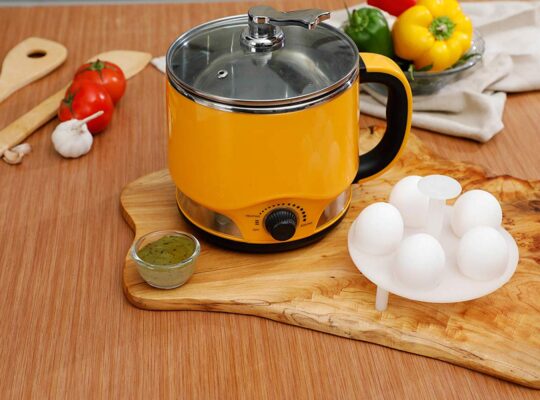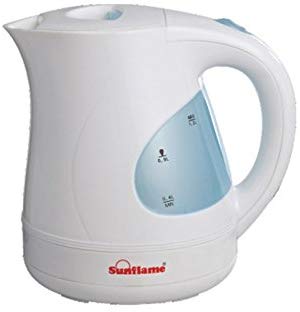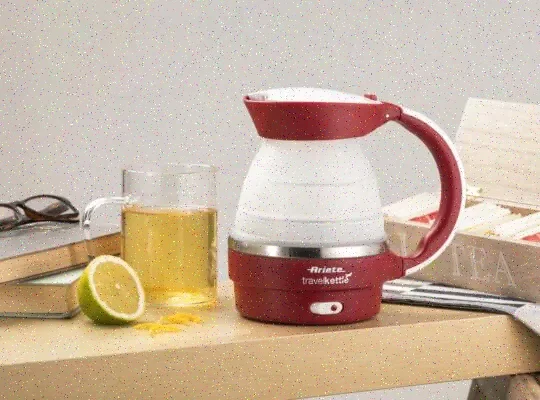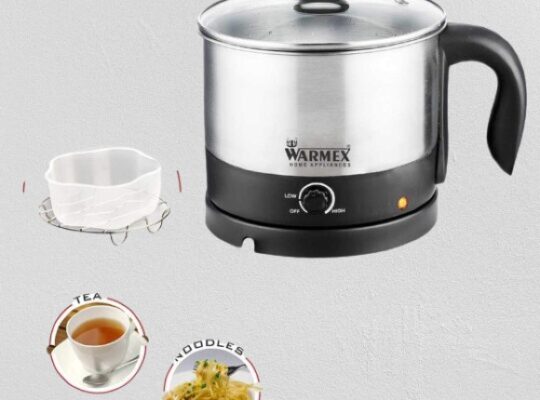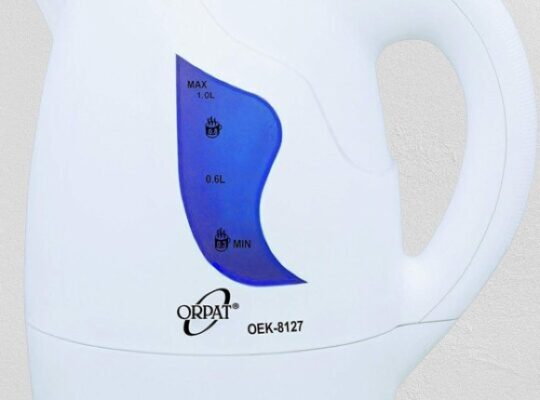Yes, you can definitely boil eggs in an electric kettle! It’s a simple and efficient method. Just add enough water to cover your eggs and set them in the kettle. Once it boils, let the eggs sit for about 10-12 minutes for hard-boiled perfection. Remember to use room temperature eggs for even cooking and plunge them in cold water afterward to stop the cooking process. Keep going to uncover more tips for achieving the best results!
Key Takeaways
- Yes, you can boil eggs in an electric kettle by submerging them in water.
- Ensure the water level covers the eggs without exceeding the kettle’s maximum fill line.
- Use a steamer basket if available to prevent eggs from cracking during boiling.
- Adjust boiling time based on desired doneness: 6-8 minutes for soft-boiled, 9-12 minutes for hard-boiled.
- Remember to cool eggs in cold water immediately after boiling for easy peeling.
Understanding Electric Kettles and Their Uses
When you think about kitchen appliances that simplify meal prep, electric kettles often come to mind, especially for their versatility and speed. These handy devices come in several electric kettle types, including variable temperature kettles for tea enthusiasts and cordless models for easy pouring. Whether you’re making tea, instant coffee, or even boiling eggs, an electric kettle streamlines the process.
It’s crucial to keep your kettle in top shape, so don’t overlook kettle maintenance. Regularly descaling it prevents mineral buildup and guarantees efficient heating. Additionally, always check for any damage to the cord or base to maintain safety. With the right care, your electric kettle will remain a reliable ally in your kitchen for years to come. Furthermore, some electric kettles, like the KENT 16069 Super Egg Boiler, are specifically designed for boiling eggs, making them an excellent choice for quick breakfast preparation.
Preparing the Eggs for Boiling
To get the best results when boiling eggs in your electric kettle, start by selecting fresh eggs. Check for cracks or imperfections, as these can affect the boiling process. For ideal egg preparation, gently wash the eggs to remove any dirt or residue. You don’t want any contaminants in the kettle. If you prefer easy peeling, consider letting the eggs sit at room temperature for about 30 minutes before boiling; this can help with the cooking process. Additionally, you might want to poke a small hole at the wider end of each egg to prevent cracking during boiling. These simple boiling techniques will set you up for perfectly cooked eggs, whether you like them soft or hard-boiled.
Step-by-Step Guide to Boiling Eggs in an Electric Kettle
Boiling eggs in an electric kettle can be a quick and efficient process, and following these simple steps will guarantee you achieve perfect results every time. Keep kettle safety in mind as you proceed with these egg boiling techniques:
- Add Water: Pour enough water into the kettle to completely submerge the eggs, but don’t exceed the maximum fill line.
- Insert Eggs: Carefully place the eggs in the kettle. Use a steamer basket if available, to prevent cracking.
- Boil: Close the kettle lid and turn it on. Once it reaches a boil, turn off the kettle and let the eggs sit for about 10-12 minutes, depending on your desired doneness.
Enjoy your perfectly boiled eggs!
Tips for Achieving Perfectly Boiled Eggs
Achieving perfectly boiled eggs goes beyond just following the steps for boiling; a few key tips can elevate your results considerably. First, consider your boiling techniques. Start with room temperature eggs to guarantee even cooking. When it comes to egg timing, a general rule is about 9-12 minutes for hard-boiled eggs, but adjust based on your preference for yolk consistency. For creamy, soft-boiled eggs, aim for about 6-8 minutes. After boiling, plunge the eggs into cold water immediately to stop the cooking process and make peeling easier. Finally, experiment with a dash of vinegar in the water; this can help keep egg whites intact and enhance flavor. With these tips, you’ll enjoy delightful, perfectly boiled eggs every time!
Safety Precautions When Using an Electric Kettle for Eggs
While using an electric kettle to boil eggs can be convenient, it’s essential to prioritize safety to prevent accidents or damage. Here are some important safety measures to follow:
- Monitor Water Levels: Always verify you’ve filled the kettle with enough water to cover the eggs. Too little water can lead to overheating and potential damage.
- Avoid Overcrowding: Don’t overcrowd the kettle, as it can cause uneven cooking and increase the risk of eggs cracking.
- Regular Kettle Maintenance: Keep your kettle clean and free of mineral buildup. This not only extends its lifespan but also guarantees it operates safely and efficiently.
- Ensure Proper Functioning of the heating element: A faulty heating element can lead to inconsistent boiling, so make sure it’s in good working condition before use.
Frequently Asked Questions
Can I Boil Eggs With an Electric Kettle Without Water?
You shouldn’t try boiling eggs in an electric kettle without water. Kettle safety is essential; without water, the kettle can overheat, potentially causing damage. Explore other boiling methods that guarantee perfect eggs and keep your kettle safe.
How Long Does It Take to Boil Eggs in an Electric Kettle?
To boil eggs efficiently in an electric kettle, it usually takes about 10 to 15 minutes, depending on your kettle’s power. Adjust the egg boiling time for soft or hard-boiled preferences, and enjoy perfectly cooked eggs!
Do I Need to Cover the Eggs While Boiling?
You don’t need to cover the eggs while boiling, but doing so can help retain heat and improve boiling techniques. Experiment with or without a cover to find your perfect egg-boiling method!
Can I Use the Kettle for Other Foods After Boiling Eggs?
Absolutely, you can use the kettle for other foods after boiling eggs. Just guarantee proper kettle sanitation. Its versatility allows you to prepare soup, noodles, or even tea, making it a handy kitchen tool!
What Types of Eggs Can I Boil in an Electric Kettle?
You can easily boil both soft boiled and hard boiled eggs in an electric kettle. Just adjust the cooking time: around six minutes for soft yolks and about ten for firm, satisfying hard-boiled eggs. Enjoy!
Conclusion
Ultimately, boiling eggs in an electric kettle is not only possible but can also be incredibly convenient. With just a few simple steps, you can enjoy perfectly boiled eggs without the hassle of a stove. Just remember to follow safety precautions and keep an eye on the water level. So, the next time you’re in a pinch, grab that electric kettle and whip up a delicious batch of eggs—breakfast just got a whole lot easier!
